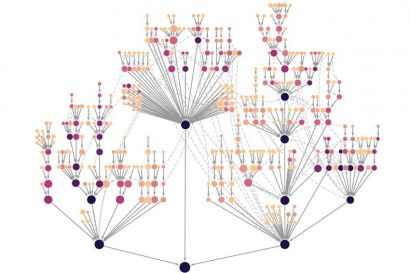- About
- Organization
- Organization Overview
- Dean’s Office
- Department of Bioengineering and Therapeutic Sciences
- Department of Clinical Pharmacy
- Department of Pharmaceutical Chemistry
- Quantitative Biosciences Institute
- Org Chart
- Research
- Education
- Patient Care
- People
- News
- Events
Map of protein systems reveals new targets for cancer treatment
By Gina Nguyen / Thu Dec 9, 2021

Krogan Lab
A birds-eye depiction of the findings from the Quantitative Biosciences Institute’s recent work on cancer. Each node represents a protein system and darker-colored nodes are more likely to be involved in cancer.
Researchers at the UCSF Quantitative Biosciences Institute (QBI) and UC San Diego have mapped previously unknown interactions between hundreds of proteins that drive cancer, unveiling potential new drug targets. The findings, announced in a trio of papers published in Science on October 1, detailed a new approach for tackling cancer and applied that approach to breast cancer and cancers of the head and neck.
The studies were conducted by scientists in QBI’s Cancer Cell Map Initiative (CCMI), an ongoing collaboration between researchers at UCSF and UCSD. QBI is an organized research unit in the UCSF School of Pharmacy.
Across the three publications, 395 protein systems were flagged for involvement in 13 cancer types. Many of these systems had not been previously described or linked to cancer mutations. The researchers also identified a subset of these protein systems as biomarkers of cancer outcomes, leading to 548 genes that could be used in clinical sequencing panels.
“We realized we need another way to look at cancer that takes it a step beyond DNA,” said Nevan Krogan, PhD, director of QBI. “Our studies provide a new definition of biomarkers based not on single genes or proteins but on the large, multi-protein complexes.”
Nobel laureate Elizabeth Blackburn, PhD, moderates a discussion between UCSF’s Nevan Krogan, PhD, and UC San Diego’s Trey Ideker, PhD, who led the recent efforts to map the protein systems that drive cancer.
More
Looking Beyond DNA to See Cancer with New Clarity (UCSF News)
Tags
About the School: The UCSF School of Pharmacy aims to solve the most pressing health care problems and strives to ensure that each patient receives the safest, most effective treatments. Our discoveries seed the development of novel therapies, and our researchers consistently lead the nation in NIH funding. The School’s doctor of pharmacy (PharmD) degree program, with its unique emphasis on scientific thinking, prepares students to be critical thinkers and leaders in their field.




